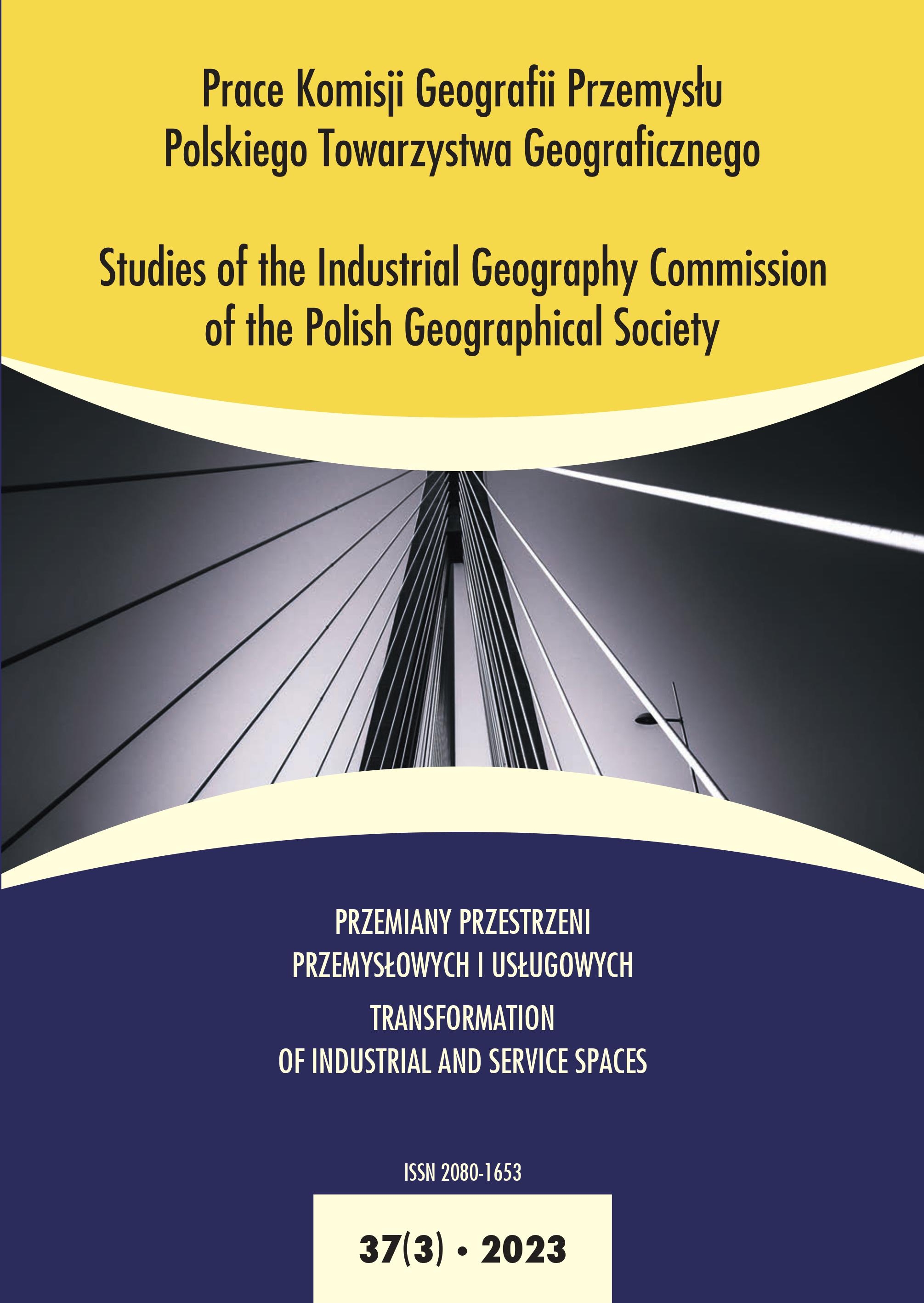From NAFTA to USMCA: the evolution of regional economic integration and the development of the Mexican automotive industry
DOI:
https://doi.org/10.24917/20801653.373.1Keywords:
Mexico, automotive industry, industrial location, NAFTA, USMCAAbstract
The aim of this article is to examine the development of the Mexican automotive industry after the country’s accession to NAFTA. Specifically, it aims to establish how the volume and structure of production changed, along with the proportion of production that was exported, particularly to other NAFTA members. It also examines how the development of the automotive industry has influenced the growth of foreign investment and the emergence in Mexico of new concerns wishing to enter the NAFTA market. It analyses changes in the distribution of the automotive industry, showing that increasing cooperation within NAFTA has influenced it to shift closer to the US border. It also seeks to establish the effects of the evolution of NAFTA and the establishment of USMCA on the automotive sector. The research uses official data from 1990 to 2022 documenting the sector’s activities, and economic censuses. The results show that entry into NAFTA was a major developmental boost for the automotive sector in Mexico. Its rapid growth was associated with a shift of production to the north, a change in production structure and greater export specialisation. The success of this sector was one of the impulses for the renegotiation of the signed agreements and the creation of USMCA, which was intended to slow down and limit the development of the sector in Mexico. The full impact of USMCA is difficult to assess as its introduction coincided with the COVID-19 pandemic, which had a strongly negative impact on the functioning of the sector. It is therefore recommended that further research be conducted to determine, from a longer‑ term perspective, which changes are due to the new realities of USMCA and which are the effects of the pandemic.
Downloads
Metrics
References
Carrillo, J. (2004). NAFTA: The Process of Regional Integration of Motor Vehicle Production. W: J. Carrillo, Y. Lung, R. van Tulder (red.), Cars, Carriers of Regionalism? London: Palgrave Macmillan, 104–117
Casado-Izquierdo, J.M. (2021). La resiliencia de la industria automotriz mexicana ante la Covid-19. Anales de Geografía de la Universidad Complutense, 41(1), 59–80. doi: https://doi.org/10.5209/aguc.76722
Censos Económicos INEGI. (2023). Pozyskano z: https://www.inegi.org.mx/programas/ ce/2019/ (dostęp: 12 styczeń 2023).
Covarrubias, A. (2020a). Mexican competitive advantage in NAFTA: a case of social dumping? A view from the automotive industry. International Journal of Automotive Technology and Management, 20(3), 239–257.
Covarrubias, A. (2020b). The Boom of the Mexican Automotive Industry: From NAFTA to USMCA. W: A. Covarrubias, S. Ramírez (red.), New Frontiers of the Automobile Industry. London: Palgrave Macmillan, 323–348.
Crossa, M. (2022). Contorting transformations: Uneven impacts of the US–Mexico automotive industrial complex. Competition and Change, 26(5), 533–553.
Crossa, M., Wise, R.D. (2022). Innovation in the era of generalized monopolies: The case of the US–Mexico automotive industrial complex. Globalizations, 19(2), 301–321.
Datos Abiertos de México. (2023). Pozyskano z: https://datos.gob.mx/ (dostęp: 12 styczeń 2023).
Dávalos, E. (2020). Protectionism, USMCA and its possible effects on Mexico’s Automotive Industry. European Review of International Studies, 7(1), 81–104.
Estudio sobre el potencial de mercado de vehículos comerciales y pesados y, su relación con la estructura económica mexicana. (2017). Universidad Nacional Autónoma de México – UNAM, Asociación Nacional de Productores de Autobuses, Camiones y tractocamiones – ANPACT, Asociación Mexicana de Distribuidores de Automotores – AMDA, México DF.
García, F.J.A., Moctezuma, A.L. (2020). La pandemia COVID-19 y su impacto en la industria automotriz mexicana, 2020. Espacio I + D, Innovación más desarrollo, 9(25), 60–79.
Información estadística de la Inversión Extranjera Directa. (2023). Pozyskano z: https://datos.gob.mx/busca/dataset/informacion‑ estadistica‑ de‑ la‑ inversion‑ extranjera‑ directa (12 styczeń 2023).
Kaliszuk E., 2017. Renegocjacja umowy NAFTA – przesłanki, priorytety i implikacje. Unia Europejska.pl, 6, 3–18.
Łasak, P. (2013). Procesy umiędzynarodowienia przemysłu samochodowego: rola rynków wschodzących. Kraków: Wydawnictwo UJ.
Liberska, B. (1999a). Kryzys finansowy w Meksyku – wnioski dla „wschodzących rynków”. International Journal of Management and Economics, 6, 35–50.
Liberska, B. (1999b). Kryzysy finansowe w Meksyku i krajach Azji Południowo‑ Wschodniej. Ekonomista, 1–2, 193–212.
Liberska B., 2010. Integracja krajów NAFTA a globalny kryzys gospodarczy. Ameryka Łacińska. Kwartalnik analityczno‑informacyjny, 18, 37–48.
Lissowski, O. (1996). Maqulladora i NAFTA prawne i ekonomiczne zagadnienia współpracy transgranicznej USA–Meksyk. Przegląd Zachodni, 4, 93–109.
Ludwikowski, R. (2019). Strategie handlowe Donalda Trumpa. Kilka refleksji nad procesem transformacji NAFTA w USMCA. Krakowskie Studia Międzynarodowe, 4, 213–222.
Moreno‑ Brid, J.C., Rivas Valdivia, J.C., Santamaría, J. (2005). Mexico: Economic growth exports and industrial performance after NAFTA. Mexico: CEPAL – SERIE Estudios y perspectivas – Sede Subregional de la CEPAL en Mèxico, 42.
Pelle, A., Tabajdi, G. (2021). Covid-19 and transformational megatrends in the European automotive industry: Evidence from business decisions with a Central and Eastern European focus.
Entrepreneurial Business and Economics Review, 9(4), 19–33. doi: https://doi.org/10.15678/ EBER.2021.09040 Puszer, B. (2000). Kryzysy finansowe w krajach Ameryki Łacińskiej (Meksyk, Brazylia). Prace Naukowe, Akademia Ekonomiczna w Katowicach, 41–64.
Shaiken, H. (2001). The New Global Economy: Trade and Production under NAFTA. Journal für Entwicklungspolitik, XVII/3, 4, 241–254.
Wójtowicz, M. (2011). Wpływ światowego kryzysu gospodarczego na brazylijski i meksykański przemysł samochodowy. Prace Komisji Geografii Przemysłu Polskiego Towarzystwa Geograficznego, 17, 129–143.
Wójtowicz, M. (2015). Przekształcenia przestrzennej struktury meksykańskiego przemysłu samochodowego pod wpływem BIZ. Prace Komisji Geografii Przemysłu Polskiego Towarzystwa Geograficznego, 29(1), 7–26.
Wójtowicz, M. (2017). Rola przemysłu samochodowego w rozwoju społeczno‑ gospodarczym Meksyku. Prace Komisji Geografii Przemysłu Polskiego Towarzystwa Geograficznego, 31(4), 83–102.
Wójtowicz, M. (2019). The Relocation of the Automotive Industry in Brazil and Mexico: Between Corporate Strategies and Industrial Policies. W: P. Capik, M. Dej (red.), Relocation of Economic Activity. Cham: Springer, s. 33–51.
Żuławska, U. (2003). Argentyński kryzys walutowy – geneza. Bank i Kredyt, 4, 38–48.
Downloads
Published
How to Cite
Issue
Section
License
Copyright (c) 2023 Studies of the Industrial Geography Commission of the Polish Geographical Society

This work is licensed under a Creative Commons Attribution-NoDerivatives 4.0 International License.
Articles are published under the terms of the Creative Commons License (CC BY-ND 4.0; Attribution– NoDerivs).

